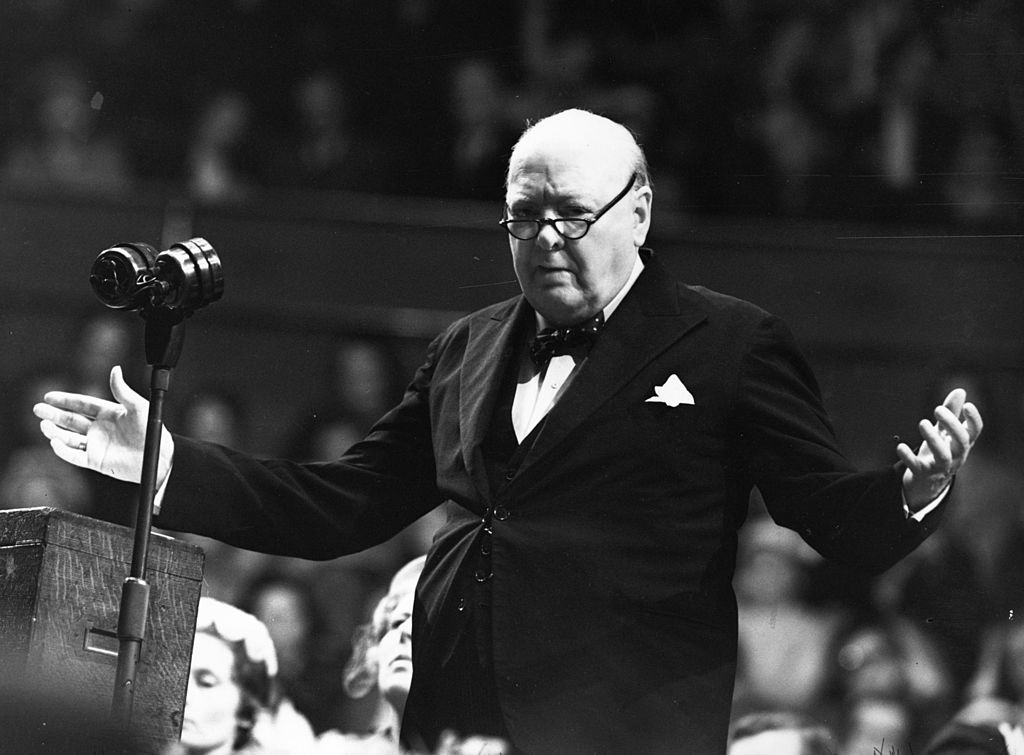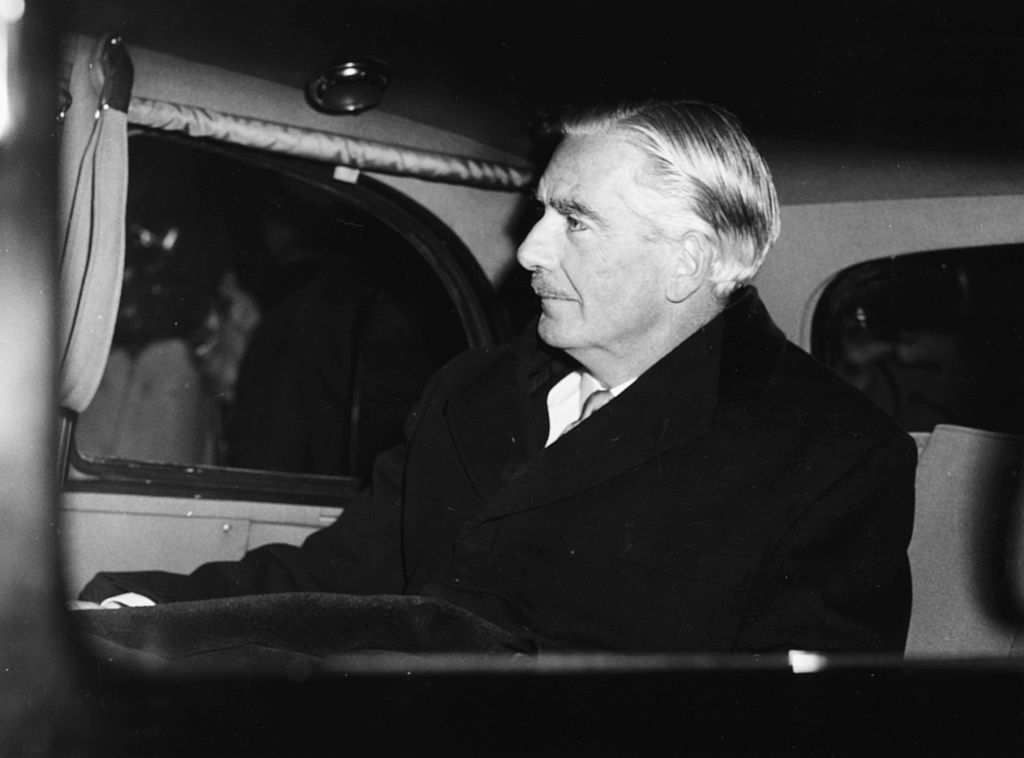U.K. Prime Minister Boris Johnson is in his third day of intensive care with COVID-19, making him the first world leader to be forced to take a break from their post because of the coronavirus. In his absence, the country’s Cabinet is collectively running the country, while Foreign Secretary Dominic Raab, who is also the U.K.’s First Secretary of State, and therefore Johnson’s de-facto deputy, is signing off on key decisions. Unusually, the U.K. lacks a constitutional arrangement that sets out a deputy who would immediately assume office if a leader is injured or dies.
This moment is somewhat unprecedented in British history. In the past, when other Prime Ministers have suffered health issues in office, there have been a variety of workarounds. Here’s how three leaders in history have handled their time out of office.
Winston Churchill
Winston Churchill, who served as Britain’s Prime Minister from 1941 to 1945 and again from 1951 to 1955, suffered a stroke in his second term, at the age of 79. It was June 1953. With his “extraordinary resilience,” says Andrew Roberts, author of Churchill: Walking with Destiny (2018), he presided over a two hour cabinet meeting the next day. “Although the Cabinet Minister spoke more than usual and [Churchill] spoke less than usual, no one realised he’d had a stroke,” says Roberts.
Churchill first went to his country house, Chartwell, and then to Chequers, the Prime Minister’s official house, for about two months to recover, according to Kevin Theakston, Professor of British Government at the U.K’s University of Leeds. “A week into his two-month recovery period, he started to meet certain political figures who would visit him,” he says.
At the time, Anthony Eden—Churchill’s successor in waiting —according to Kevin Ruane, Professor of Modern History at the U.K.’s Canterbury Christchurch University, was also seriously unwell after undergoing a nearly fatal series of botched bile duct operations in April. “He was in no position to take over and that caused a mini-constitutional crisis,” he says. As a result, it fell to then-Chancellor of the Exchequer Richard Austen Butler to chair the Cabinet until mid-August when Churchill resumed this duty.

During July and part of August, Churchill “only paid spasmodic attention to certain government business” and there are many accounts of him reading novels by C.S. Forester and snoozing, says Theakston. The Prime Minister started to pay more attention to government paperwork as he recovered, he adds.
Roberts says that Churchill mostly worked from his bed and this was not seen as unusual. During his premiership in World War Two, Churchill would work in bed until lunch time, says Roberts, adding that ”He was never expected to be zooming around much at the best of times. People did not expect to see very much of him anyhow.”
Behind the scenes, the day-to-day work of government work was largely carried out by three of Churchill’s close aides. “Often they sent out memos in the name of the prime minister, when perhaps Churchill hadn’t even seen the memo. They knew his thinking pretty well,” says Theakston.
A big difference between then and now was that “all of this was a secret,” says Theakston. Almost no one knew about the stroke, apart from Queen Elizabeth and some Cabinet Ministers. It was the “last time” such secrecy was possible, says Roberts, made possible by the fact that “Churchill was a close friend of the press barons” who agreed not to publicize it.
By October 1953, Churchill fully returned to work. But the Prime Minister, then nearly 80 years old, was going deaf and an “enormous hearing aid” would be placed in the middle of the Cabinet table, attached to his ear, so that he could hear everyone, says Roberts. After Churchill left office in April 1955, he started to have a series of strokes that eventually led to his death in January 1965.
Anthony Eden
Churchill’s successor Anthony Eden battled with long term health problems, including depression, jaundice and the presence of gallstones, and resigned two years into his premiership in January 1957, after his doctors warned him his life was at stake if he continued in office. He stepped down at the height of the Suez canal crisis, precipitated by the nationalization of the canal by then-Egyptian president Abdul Nasser in July 1956. The canal had been owned by the Suez Canal Company, which was controlled by French and British interests.
Fearing a new Arab alliance, Eden cut off oil supplies to Europe and conspired with France and Israel in order to retake the canal through what the U.K. government today calls a “badly performed invasion.” It drew widespread international criticism and Eden was forced into a humiliating retreat.

“The Suez crisis placed a massive strain on Eden that was compounded by a recurrence of illness and then the drugs used to treat that illness,” says Theakston.
In November 1956, Eden went to Jamaica for three weeks to recuperate, during which time then-Leader of the House of Commons Butler and then-Chancellor of the Exchequer Harold Macmillan, took the lead in deciding on matters in government, says Theakston.
There seems to have been a hidden “succession struggle and rivalry” between Butler and Macmillan, adds Theakston. When Eden resigned in January 1957, it seems Macmillan ultimately won as the Queen swiftly appointed him to the role of Prime Minister. His “number one job” on taking office, says Roberts, was to “repair the damage that the Suez crisis had done with the U.S.” As Macmillan had a “very good war time relationship” with then-U.S. President Dwight Eisenhower, and knew him “extremely well”, says Roberts, he began to reestablish the special relationship between Britain and the U.S.
Margaret Thatcher
Margaret Thatcher was generally in good health during her time as Prime Minister from May 1979 to November 1990, famously surviving on four hours’ sleep a day. However, in August 1983, Thatcher, then 57 years old, suffered a detached retina in her right eye, requiring her to have an eye operation and spend three nights in hospital.
William Whitelaw, then-deputy leader of the Conservative Party, stood by in case he needed to take over her day to day duties, but a spokesman at the time emphasized that Thatcher remained in charge and would keep in touch by phone. According to the 1983 diary of Thatcher’s Chief Economic Adviser Alan Walters, she stopped working late into the night after her operation. But as parliament was in recess for the summer, her workload was already lighter.
In 1986, Thatcher went back into hospital for two days for an operation on her hand after suffering from Dupuytren’s Contracture, a condition that causes one or more fingers to permanently bend toward the palm. “She couldn’t use her right hand because it was bandaged up for a while when she came out,” says Theakston.
Thatcher’s advisors drew boxes next to options on her memos and she used her left hand to tick the box next to the decision she approved. Theakston says that before her operation “Thatcher would underline, write exclamation marks, and comment in the margin. She was always active in expressing herself on the paperwork.”
More Must-Reads from TIME
- Donald Trump Is TIME's 2024 Person of the Year
- Why We Chose Trump as Person of the Year
- Is Intermittent Fasting Good or Bad for You?
- The 100 Must-Read Books of 2024
- The 20 Best Christmas TV Episodes
- Column: If Optimism Feels Ridiculous Now, Try Hope
- The Future of Climate Action Is Trade Policy
- Merle Bombardieri Is Helping People Make the Baby Decision
Contact us at letters@time.com